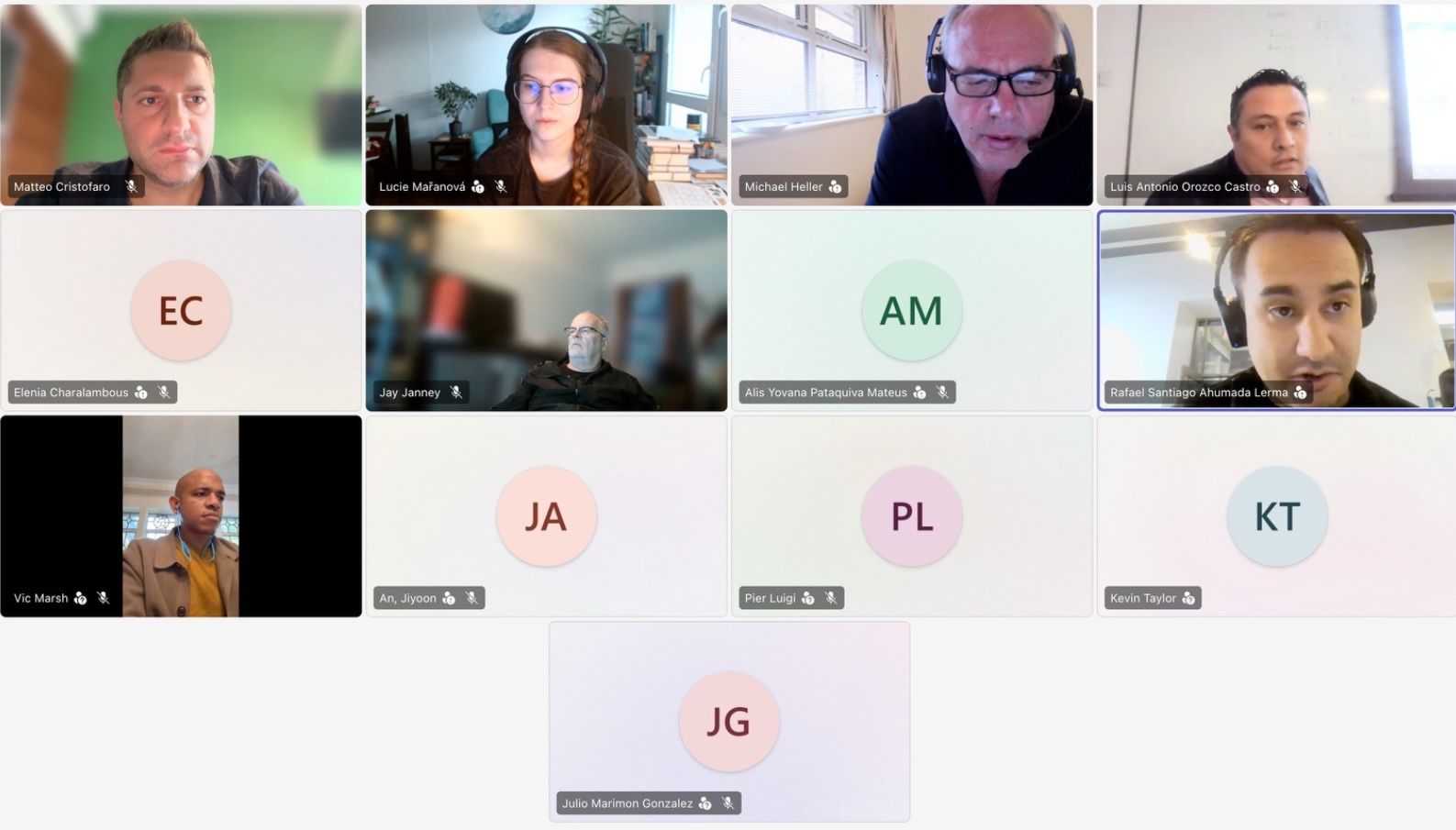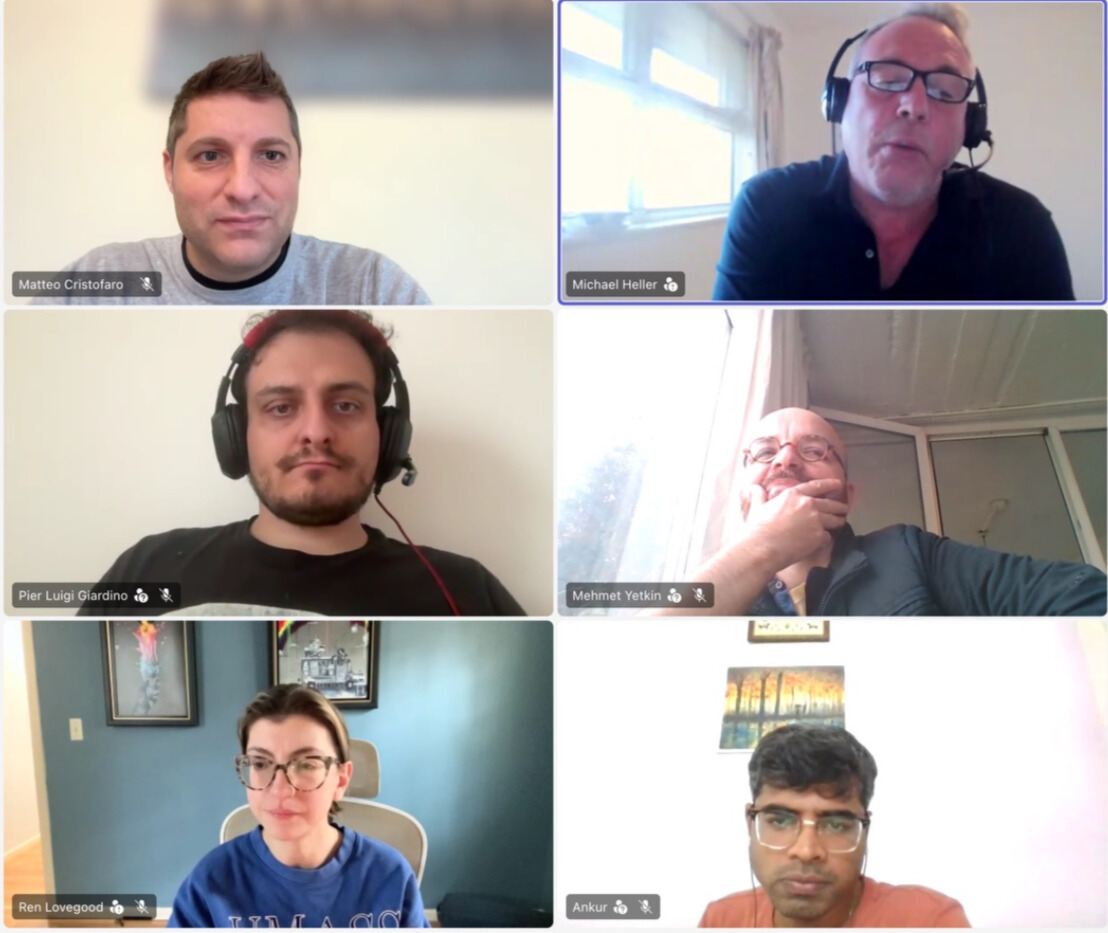
On Oct. 15, 2025, we hosted the first part of the workshop hold by Michael Heller (Northumbria University) dedicated at exploring the techniques, strategies, and approaches needed for successful research funding applications. Drawing on the convenor’s decade-long experience as both a successful grant applicant and a grant assessor for the British Academy and the Leverhulme Trust, the session guided participants through the key stages of preparing a compelling proposal. It focused on the first part of the grant process—selecting a research topic, designing research questions, framing an effective research methods section, and addressing the often-overlooked area of project partners and letters of support. The workshop was highly interactive, enriched with practical examples, and served as the first installment of a two-part series on successful grant applications.

On Jan. 15, 2026 was held the second part of the workshop during which Michael Heller emphasized the importance of timelines and budgeting for increasing the chances of winning grants.

Following the workshop, Prof. Heller released an interview with Lucie Mařanová. We are immensely grateful to Professor Heller for his time, contribution to the MHD community, and for sharing his rich experience and valuable perspectives.
*****
From Classical History to Corporate Archives: Professor Michael Heller’s Unexpected Journey into Business History
Written by Lucie Mařanová (Prague University of Economics and Business - VSE; MHD communication volunteer)
Michael, what first attracted to you to the history of management and organizational studies rather than, say, a more conventional business or marketing path?
I actually fell into business history by accident. I had no intention. When I started my research, I didn't even know that there was business history. I'm a classical historian. I did my degree at Cambridge and then my master's and PhD at University College London in history. Both of those were elite institutions, I think at the time. Cambridge was number one in the world for history and UCL was #7 or #8, but I actually started off with my thesis was it was quite too complicated.
I wanted to look at the relationship between national identity and masculinity. I was always very interested in national identity but realized it was gendered. I read Family Fortunes by Davidoff and Hall, which is one of the most important books in social economic history, and they did the middle-class version of E.P. Thompson's The Making of the English Working Class. They discussed how the middle class in the 18th century created the concept of separate spheres for men and women. The public sphere as masculine, and women remaining in the home. This started me thinking that national identity was in the public sphere and not the private sphere, meaning women in the 19th century effectively did not have a national identity - it was male.
My supervisor said, "this is a brilliant idea, but what are you going to study?". I read an article by John Tosh about liminal masculinity, where he spoke about clerical workers (the lower middle class). He said these people were really interesting because they thought they were middle class, were very nationalistic, and had a very specific masculinity. I decided to study the history of clerks. I started going into companies, banks, railway companies, insurance companies to research them at work. I never realized that businesses had archives. That is how I fell into business history. A project originally about masculine and national identity became a history of the office. I realized this little group of people was revolutionary. They were the first group to be given a paid holiday, leading to the emergence of holiday towns. They were also linked to the suburban novel, sitcoms, comedies, shopping, and home ownership. They were immensely important.
Because of your purely historical background did you have to learn how to write more as a business or economic scholar?
No, no, because I was a socio-economic historian even when I was a classical historian. I've studied sociology, so I understand how to write in that kind of social science manner. I've never learned econometrics or complex statistical analysis, but I know some basic statistical analysis.
It's interesting because I started teaching marketing. If you look at the foundations of marketing, it's based on three subjects: sociology, psychology, and applied economics. I'd studied them before, so I never had to fundamentally change my writing style.
Before I was an academic, I was an English teacher as a foreign language. I lived in Turkey, Spain, and Germany. I realized I could make more money teaching English to businesses. So I worked in businesses across Europe: in a car factory in Spain, in banks in Germany, in Siemens, and even in a coal mine. I thought: "God, these companies are really interesting. Business is interesting. Their history must be interesting".
One thing that really pulled me to business history was the archives. We were always taught history is rare and badly funded. But when I went to the Royal Bank of Scotland (RBS), which was one of the biggest banks in the world at the time, their archive blew me away. RBS traces its history back to the 17th century and has absorbed 400 banks over 350 years. I think RBS employs 10 full-time archivists, and when I saw the resources they had, it was incredible. That is why I ended up teaching marketing and not history: marketing has more resources.
Business history is often judged as not real history by traditional historians, but I think that is wrong. As I tell my students, the word "company" literally means "to eat bread together" in Spanish Latin, which shows that business is fundamentally a social process as much as it is an economic process. There used to be a Scottish historian from the Enlightenment who said, "there is more to history than the mere counting of chamber pots". That's a lovely quote because it tells you that business history isn't just about simple business ; it's much, much, much bigger than that.
You are talking about the importance to work with the companies and you were talking about it in the workshop as well about the partners. So how actually does the collaboration look like in practice? Can you give me some examples?
The collaboration is incredible. For example, we have a podcast series on businesses, our webcast, and we've already recorded 24 episodes. A lot of those feature practitioners. I interviewed Mark Wright, the founder of Simply Communicate, who talked about working in internal comms for 40 years, making videos for corporations in the 1980s, and the change in banking.
I don't just go to academic conferences; I go to practitioner conferences. I recently returned from America, where I was in Nashville for Unite 25, a two-day practitioner event. Speakers were from American Airlines, British Airways, and Johnson & Johnson. They are fascinated with what we're doing.
For me, the knowledge we have is there to be shared with practitioners, not just with other academics. Not doing that would be like training for a marathon but never running in a marathon. A great example is my research on John Lewis, the department store. They are Britain's biggest employee-owned cooperative. The man who set up John Lewis ensured they had a magazine, The Gazette, to give employees information because he understood the importance of internal communication as a way of informing and empowering employees. While researching there, I noticed the archivist was constantly taking calls from people within the company who were using the Gazette for information. The archivist told me: "this archive is living memory for the organisation."
The history is still living. In their archive, they have a design section containing original wallpaper designs from the Titanic. Designers copy those designs and put them into new products. I think that's lovely; there are some organizations that understand their archive is a resource, a depository of memory, which can be used.
How do you approach these businesses? Do you just write them e-mail?
I think that's a really important question. The true way of measuring the value of a business historian, I believe, is the relationships that they have with archives. How many archives they know, and that they know where the information is. They have a deep relationship with archives.
A few years ago, there was a quote by Doctor Johnson written on a banner at the British Library: "There are two types of knowledge in the world. The first is knowing things, and the second is knowing where to go to know things". I think that is the fundamental knowledge of a historian: good historians don't just know about history, they know where to go to find out more about history.
It's about relationship building. In Chinese, there is a wonderful word called Guanxi which means relationships. You cannot do business without Guanxi in China. The Chinese have a lovely expression: "We eat first and then we do business," meaning we develop our relationships.
What I did was I developed relationships with archivists. With my PhD, I was at companies like the Royal Bank of Scotland and Prudential, and then I went to places like Shell and John Lewis. Archivists give you feasibility. If you want to go into a new archive, say, a sensitive one like a defence or pharmaceutical company, you can say, "Look, it's okay, I have worked with these archivists and done research here and here." Then they will open the door to you. That relationship building was the reason why I got the grant; I was able to use those relationships as a resource to support me.
How do you see digital technologies affecting the work on history of business and communication?
I think it's positive. I really do. I mean, I'm going to say that guarded, because the idea that everything will be digitized is complete rubbish. The reality is, most businesses don't know what's in their archive. They're just so big. You know that when you go into the British Museum, you only see 10% of what they actually have, but a lot of what they have, they don't even know they have it; it hasn't been catalogued. When I was doing research for a paper on content marketing in the gas industry, I went to the gas archive. They gave me this tiny little catalogue book and said, "that's all we've catalogued, but you're quite welcome to walk around." It was a huge warehouse with shelves and shelves of uncatalogued boxes. A lot of businesses don't want you to go into their archive because they're worried you might find something that they don't actually know about.
I remember when I was doing my research for my master’s degree, I was looking at anti-Semitism in the East End of London in the 1930s. I had to get special permission from the Jewish Board of Guardians to go into their archive because it was that sensitive. I actually found a shocking document in the records from the council: it suggested it may be a good idea to get the Eastern European Jews, who were not assimilated and were poor, to relocate them into Palestine. This was potentially embarrassing to the community because they were talking about organized deportation, exactly what the Nazis were talking about. They didn't know that document was in there.
So, when people talk about the digitization of the archive, it's the digitization of what people know is in the archive. I think in 10 or 20 years time, only a little bit of the archive will be digitized. I think what will be digitized are the narrative sources like company magazines because they're easy to digitize. But I don't see the documentary sources like minutes and memos being digitized, which is what's often more interesting.
I think technology is good. The nice thing about digital archives is they're very readable. My productivity as a historian has probably increased 100% using things like scanner app in my phone. In the past, it would take me two days to get through a couple of files at the BBC archives; now I did it in under a day, and the images are clear. You develop your own digital archive.
I think one of the dangers is that it will give non-historians access to historical records. I think that's dangerous because if I wanted to understand chemicals, I'd have to be trained in a laboratory. It's the same for history. People will get access to this, but they won't understand. Nietzsche, who had a PhD in history, wrote a beautiful essay called On the Uses and Abuses of the Past. He said we must be careful in how we understand the past, or "we will be tourists wandering aimlessly around the pyramids." The danger is you'll have people going to archives like tourists, not knowing what they're seeing.
If you cheapen history by making it too popular, you can destroy everything. However, I think in the future, historians will become more important because they can guide other people on how to access that past. The future role of the historian is as the interpreter, as the curator, as the guide to this democratic past.
*****
Watch Prof. Hellers presentation (pt. I) and interview: https://shorturl.at/qMygp
Watch Prof. Hellers presentation (pt. II): https://shorturl.at/ORx6K